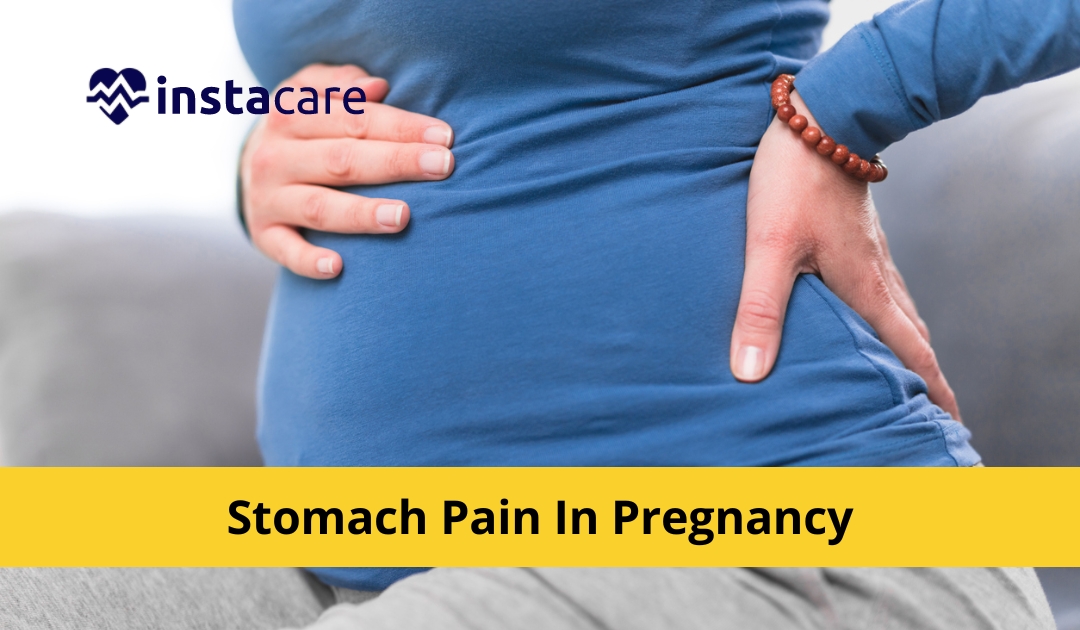If you are pregnant, stomach pains can be one of the more uncomfortable parts of pregnancy. Even though it may seem unusual to experience this type of discomfort during a time when your body is going through so many changes, understanding what could be causing them and knowing how to manage them can help make pregnancy easier.
In this blog post, we'll take a look at some common causes for stomach pain in pregnancy as well as provide practical advice on how best to cope with such discomforts. Read on and learn everything there is to know about managing your own unique set of aches and pains while you navigate through this special journey!
What is stomach pain in pregnancy?
Stomach pain in pregnancy is a common symptom that can range from mild to severe in intensity. It typically occurs during the first and third trimester, more frequently at night during the first trimester.
While stomach pain is often associated with indigestion or gas due to changes in hormone levels, stomach pain may also be caused by other factors such as stretching of ligaments supporting the uterus, constipation, dehydration, or urinary tract infections. More serious causes of stomach pain include preterm labor or miscarriage so contact your doctor when stomach pain persists.
Possible causes of serious stomach pain
Stomach pain can be caused by numerous triggers ranging from common stomach issues to serious underlying conditions. In some cases, stomach pain in pregnancy is normal and can be eased with simple remedies such as proper hydration, increased rest, and eating small meals at regular intervals.
Other more serious stomach pain causes could include digestive issues like an inflamed pancreas or gallbladder disorder; food poisoning, gastroenteritis or celiac disease; kidney or bladder stones; or an infection such as a stomach virus or appendicitis. If stomach pain persists for more than a few days it is important to seek medical attention right away in order to properly diagnose the cause of the pain.
1- Digestive problems
Digestive problems can be common both during pregnancy and afterwards. Symptoms may include stomach pain, nausea, gas, bloating, constipation, heartburn and more. In pregnant women, stomach pain can be worrying because it can vary in intensity from mild to severe and may indicate a more serious underlying condition.
It is important for pregnant women to contact their doctor if they experience stomach pain as certain conditions like preeclampsia and obstetric cholestasis need to be ruled out as soon as possible. Eating small meals throughout the day, avoiding large fatty meals and limiting processed foods may help to reduce stomach pain and other digestive problems. Additionally, drinking plenty of water and exercising regularly are often recommended to ease stomach aches during pregnancy.
View More: Cramping During Pregnancy All You Need To Know About
2- Strained muscles.
Strained muscles can cause aches, pains, and cramps in the body. Often times the level of pain and soreness in a muscle indicates that it has been overworked or injured. For example, stomach pain during pregnancy is often caused by extra strain on the stomach muscles as the uterus grows larger. Knowing how to heal strained muscles is key for long-term comfort.
This can include massage and stretching, taking hot baths with epsom salts, and applying a cold compress to help reduce inflammation. Making sure to get plenty of rest is also important so that your body can fully recuperate from a strain.
3- Cramping.
Everyone experiences stomach pain occasionally; however, stomach pain in pregnancy can take a more serious turn. As the uterus expands during pregnancy, cramping can occur in various parts of the body ranging from mild to severe shooting pains. For some women, stomach cramps may be the result of their body preparing for labor.
Despite being mostly uncomfortable and a sign of impending childbirth, stomach cramps are usually harmless and should not lead to any long-term concerns. It is important, however, that pregnant women bear in mind they may experience stomach cramps throughout the whole course of their pregnancy and be sure to contact their doctor if the pain becomes exceptionally build or intense.
4- Gas, bloating, or constipation.
Experiencing stomach pain during pregnancy is a common complaint, whether that be due to gas, bloating, or constipation. It's disagreeable to say the least and can range from mild discomfort to severe distress. Gas and bloating are usually caused by increased levels of progesterone - the hormone responsible for keeping ligaments nice and loose during pregnancy - which slows down digestion and can cause stomach bubbling and may even lead to stomach cramps.
Fortunately, there are several things you can do to alleviate these symptoms, such as eating smaller meals throughout the day rather than large portions, opting for food richer in fiber, avoiding fried foods and heavy sauces, and staying hydrated with plenty of water. Constipation is another stomach woe experienced by many moms-to-be; it is caused by hormonal changes that make bowel movements slow down.
To overcome this problem once again it is important to stay well hydrated as well as incorporating more soluble fibers into your diet like oats, nuts, beans and dried fruits. If you continue facing stomach upset despite implementing some of these simple diet changes then speak with your doctor; they will suggest lifestyle adjustments or medications so that you can feel more comfortable.
5- Round ligament pain
Round ligament pain is a stomach pain that many pregnant women experience during their pregnancy. This type of pain is caused by the stretching and growth of the round ligaments in the stomach, which expand to accommodate for the growing baby. While this type of stomach pain can range in severity, it usually starts as a sharp or dull ache and can last several minutes or even hours in some cases.
If you experiencing round ligament pain while pregnant, it's important to rest and avoid making sudden movements as this can exacerbate the pain. Additionally, you may want to talk to your doctor if pain persists or becomes very severe, to rule out any other possible medical issues.
Types of stomach pain in pregnancy
1- Lower stomach pain in pregnancy
Stomach pain in pregnancy is surprisingly common, with more than half of all pregnant women reporting some sort of stomach discomfort. While stomach aches can be unpleasant and uncomfortable, the good news is that most stomach pain that occurs during pregnancy isn't a cause for concern.
Common causes for stomach aches in pregnancy include constipation or gas pains, or the round ligament stretching and shifting as your baby grows. It can also be caused by late-night snacking or eating too much at once, so make sure to take smaller meals throughout the day! Ultimately, if stomach pain persists or is accompanied by any other symptoms like vomiting or fever, it’s best to consult your healthcare provider to determine the cause and appropriate treatment.
View More: Bleeding After Sex During Pregnancy Is It Normal
2- Left side stomach pain in pregnancy
Experiencing stomach pain in pregnancy is a common occurrence. Left side stomach pain during pregnancy can be caused by a variety of factors, including digestive issues, constipation, and the enlarging uterus putting pressure on organs. Rarely can it be a symptom of an ectopic pregnancy or an ovarian cyst.
Experiencing stomach pain at any time during your pregnancy should always be discussed with your healthcare provider for diagnosis. Furthermore, you should seek immediate medical care if stomach pain is accompanied by fever, intense pelvic or shoulder pain, or bleeding. Mild stomach discomfort often can become managed with lifestyle changes like drinking plenty of fluids and getting enough rest. Nevertheless, stomach pain episodes that persist beyond simple home remedies should always be reported to your healthcare provider to ensure the health of you and your baby.
3- Right side stomach pain in pregnancy
Experiencing stomach pain during pregnancy is a common occurrence- and usually, there is nothing serious to worry about. However, stomach pains that persist on the right side of the stomach during pregnancy may be indicative of something more serious and should be checked by your healthcare provider.
This type of stomach pain might be accompanied by a burning sensation or soreness in the stomach area, and can even radiate to the lower back or shoulder. You should consult with your healthcare provider for proper diagnosis and treatment, as this kind of stomach pain could be related to indigestion, constipation, or even appendicitis, which is a potentially serious condition requiring emergency medical attention.
Taking good care of yourself through adequate rest and nutrition can help reduce stomach pains during pregnancy - but if you have persistent right sided stomach pains that last longer than 24 hours, seek medical advice right away.
4- Upper stomach pain in pregnancy
Upper stomach pain in pregnancy is a common discomfort during the nine-month gestation period. It may be caused by pressure from the growing baby on a woman's internal organs, resulting in lower abdominal pains that can often be described as a tightness or pulling sensation.
Mild stomach cramps may also occur around the time of implantation and at various times throughout pregnancy. Women should contact their obstetrician if stomach pain persists, increases in intensity, or is accompanied by other unpleasant symptoms such as spotting or bleeding.
Taking an over-the-counter antacid to provide stomach relief is usually safe and usually provides temporary symptom relief; however, it is advisable to speak with your physician before taking any medications while pregnant.
Are cramps in pregnancy normal?
While stomach pain in pregnancy can be normal, if you are experiencing cramps in pregnancy it is important to speak with your doctor. Cramps in pregnancy may indicate something more serious such as preterm labor, an infection, or ectopic pregnancy.
It is common for pregnant women to experience stomach pains during early and mid-pregnancy due to their growing uterus putting pressure on other organs; however, any stomach pain accompanied by cramping should always be discussed with a healthcare professional. Consulting with your doctor allows them to assess the situation more thoroughly and ensure that any medical issues are dealt with carefully.
How to relieve stomach pain in pregnancy?
Experiencing stomach pain in pregnancy can be a very uncomfortable and worrying experience. Fortunately, there are some natural remedies that expectant mothers can take advantage of to ease the discomfort and help soothe stomach pain. These include drinking plenty of fluids such as water or herbal tea, eating smaller meals more frequently throughout the day, and avoiding foods that are difficult to digest.
Taking a walk can also help by improving digestive function and increasing circulation in the stomach area. If symptoms persist, it is important to consult your doctor for further advice on how best to manage stomach pain during pregnancy.
Conclusion
In conclusion, it is important to be mindful of the symptoms of pregnant stomach pain and to seek help from your healthcare provider if you feel any persistent or worsening discomfort. Depending on your individual case, management of the condition may include several options like rest and relaxation, dietary changes, medication, or in serious cases, surgery. Stomach pain during pregnancy can be extremely uncomfortable.
However, with proper care and diagnosis it can be managed with minimal risk to the baby and mother. Expectant mothers should never hesitate to reach out for help and advice when they are concerned about their health or that of their baby; after all, prevention is always better than cure!
Please book an appointment with the best Gynecologist in Lahore, Karachi, Islamabad, and all major cities of Pakistan through InstaCare, or call our helpline at 03171777509 to find the verified doctor for your disease.












